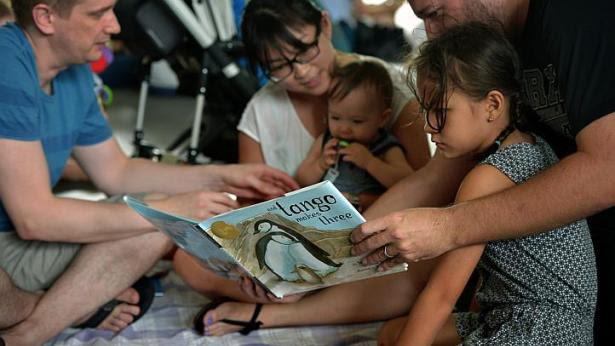Last week Singapore’s National Library Board, a government agency that oversees public libraries in the city-state, announced that all copies of three children’s books that mention same-sex adoptive parents have been removed from library collections and will be destroyed. One of the books, And Tango Makes Three, is no stranger to censorship—in fact it made the American Library Association’s annual list of the top ten banned and challenged books in the U.S. for six of the past eight years. The NLB said it undertook a review of the books after unspecified complaints from members of the public and decided they were “not ‘pro-family.’ ”
Tango, of course, is based on the true story of Roy and Silo, two male penguins in the Central Park Zoo who were given an adopted egg after zookeepers observed them trying to hatch rocks together. Their egg produced a female chick named Tango, whom they raised just as an opposite-sex mated pair would. The other two books, The White Swan Express: A Story About Adoption and Who’s In My Family: All About Our Families both depict diverse human families including some with same-sex parents. Although gay sex is outlawed in Singapore—a legacy of the British colonial era—it is rarely prosecuted, and an annual Pride rally last month drew 26,000 people.
While there obviously are families in Singapore who can identify with the characters in the three books, Information Minister Yaacob Ibrahim cited “prevailing norms, which…support teaching children about conventional families, but not about alternative, non-traditional families” to justify the ban. Ibrahim and the NLB seemed somewhat surprised, then, to find that many Singaporeans did not in fact agree with the decision. Several authors cancelled their participation in government-run writing and literacy events in protest, and about 400 people showed up for a parent-organized read-in on Sunday. Online opponents of the ban started a Change.org petition, an open letter to the NLB, and a hashtag, #FreeMyLibrary.
Apparently caught flat-footed by the backlash, NLB chief executive Elaine Ng said on Saturday that she was “saddened by [protestors’] disappointment in us” but would not be reconsidering the decision. She also said she regrets that the review process and the ban were not carried out with more transparency, but now is not the time to provide more details because “things are still fairly emotional.” Although it seems like a miracle might be necessary to save the books in the face of such obstruction, we commend the thousands of Singaporeans who continue to fight the good fight for free expression!
We need your help to keep fighting for the right to read! Help support CBLDF’s important First Amendment work by visiting the Rewards Zone, making a donation, or becoming a member of CBLDF!
Contributing Editor Maren Williams is a reference librarian who enjoys free speech and rescue dogs.
